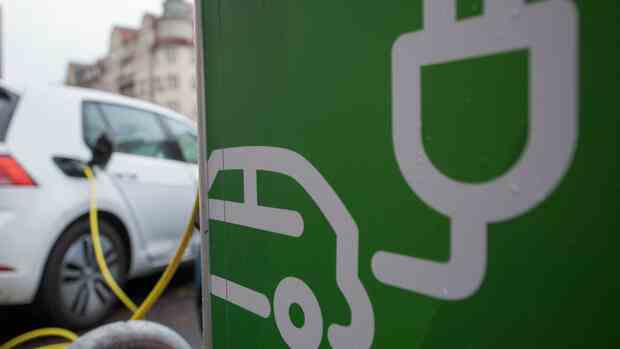Washington, Brussels Efforts to defuse the transatlantic subsidy dispute are apparently moving forward. The White House on Thursday first presented guidance on how to implement the Inflation Reduction Act (IRA), which is due to take effect in January. This includes details on the planned tax credits for electric cars and batteries.
A breakthrough is now on the horizon. The 182-page White House document suggests that the US wants to grant the European Union an exemption rule. On page 45 it says that the tax credits should also apply to e-cars whose battery components come from countries “from trustworthy trading partners”. That would include batteries or battery parts from the European Union. Cars from the EU could then at least partially qualify for the grants.
So far, the IRA should be interpreted much more strictly. The legal text contains protectionist content requirements for rare minerals and components in electric car batteries. By 2024, 40 percent should come from North America or from US free trade partners, by the end of 2026 the share should rise to 80 percent. The addition of “from trusted trading partners” would be a significant relaxation of these regulations.
Top jobs of the day
Find the best jobs now and
be notified by email.
>> Read also: The EU and the USA want to use these tricks to defuse their subsidy dispute
However, there still seems to be some ambiguity from the US government. Because only three pages later, the paper again tightens the battery rules. On page 48 it says literally: “The vehicle must contain a certain percentage of critical minerals that have been extracted or processed in the United States. Or in a country with which the United States has a free trade agreement.”
If the IRA is interpreted accordingly, this would exclude European vehicles. The USA has neither a free trade agreement with the EU nor with any other EU country.
The will to compromise is there
In principle, however, the US government is willing to find compromises with Brussels. As the Handelsblatt learned from negotiating circles, several interpretation tricks of the IRA are under discussion. They would at least limit the negative impact of US climate subsidies on European industry.
“We undertake to continue to understand the concerns of the EU (…),” said a spokesman for the National Security Council when asked by the Handelsblatt. The White House Security Council is part of the US-EU task force on the IRA, tasked with resolving disagreements with the law. “We assume that the talks will continue,” the spokesman said.
Overall, the IRA includes $ 370 billion, which should flow mainly in the form of tax rebates. Anyone who produces wind turbines or green hydrogen in the USA, who buys an electric car or puts solar panels on their roof will in future be rewarded by the state – but only if the products, or at least significant parts, were manufactured in the USA.
At the EU summit in Brussels on Thursday, the European heads of state and government discussed the subsidies conflict with the Americans. There was a “deep discussion”, reported an EU official. The EU leaders were informed about the negotiations between the Commission and the US government and advocated continuing the talks in order to find an “effective solution”.
>> Also interesting: Habeck’s answer – The Minister of Economic Affairs reacts to Biden’s billions in subsidies
At the same time, the Europeans want to pursue an independent industrial policy – to “protect Europe’s economic, industrial and technological base”, as the EU official explained. The heads of government had therefore instructed the Commission to present proposals as early as January on how investment conditions could be improved. In addition, the Commission should quickly present a strategy to strengthen productivity and competitiveness.
Federal Chancellor Olaf Scholz (SPD) summarized the decisions at a press conference in the evening as follows: The aim for the next few weeks is to agree “a fair framework with the USA”. “And then it will be a question of making regulations with which we can defend our own industrial development.”
EU Commission President Ursula von der Leyen has proposed a “European Sovereignty Fund” to finance industrial policy projects in the area of green transformation. However, this proposal is controversial among member states because it may require new community bonds. Dutch Prime Minister Mark Rutte, a declared opponent of joint EU finances, emphasized his skepticism on Thursday.
More: Comment – the US will benefit from Biden’s green revolution for decades to come
